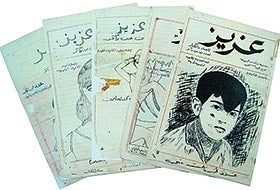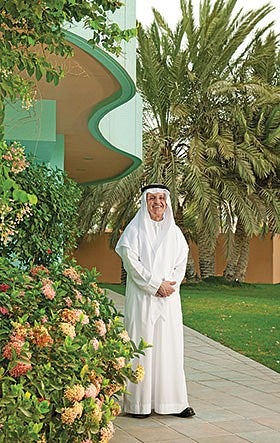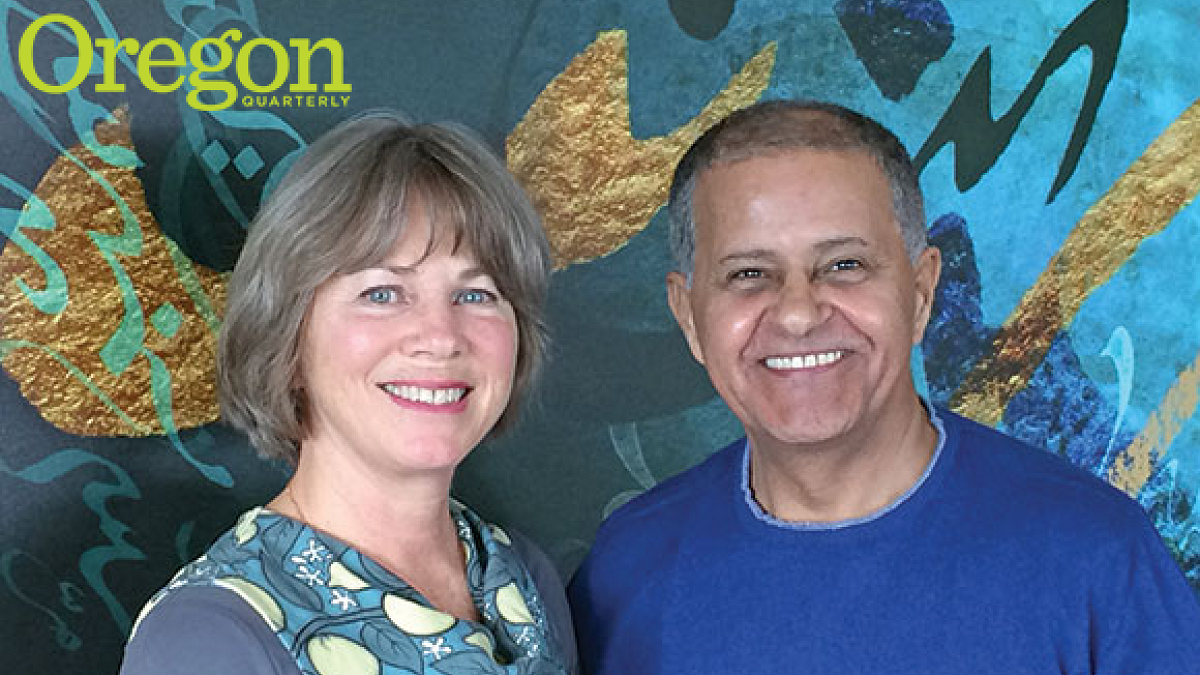The instant he spotted her across a crowded EMU Fishbowl, Khalid Al Suhaimi wanted to know everything about Jane Goodwin, a petite, graceful Oregonian who, that day, went on her way unaware of his existence. That would change, but let’s not get ahead of ourselves.
This is the story of three alumni whose time at the UO changed their lives in extraordinary ways. For Jane, it would lead to planting seeds of wellness in a culture that lacked fitness outlets for women. For Khalid and his older brother, Aziz, it would transform their outlook on life and business. They would go on to help build their family’s modest regional trading company into an Arabian Gulf conglomerate with diverse subsidiaries in construction, manufacturing, commercial supplies, and services.
When Khalid followed Aziz to the University of Oregon in the 1970s, they were among the first Saudis to study in the United States. Though three years apart, they are so similar—with eyes, smiles, and laugh lines that radiate kindness—they could be mistaken for twins.
The brothers grew up with seven siblings in Bahrain, an island nation that later became connected to Saudi Arabia by a causeway. As children, they loved the books and magazines their father acquired on trips to Persia and India, where he bought food and supplies for his brother, a merchant in Saudi Arabia. For Aziz, the fascination with books went beyond reading. He created a weekly neighborhood magazine. He drew illustrations, enlisted his sisters as gossip columnists, and built a loyal readership.
The boys’ father died when Aziz was 16 and Khalid was 13. “After that, our uncle Abdul Rahman became like a father,” Aziz says. “Although he had not traveled, he encouraged us to study abroad. A good friend who was studying at Oregon said it had a beautiful campus, good reputation, and a futuristic outlook on education.”
In 1968, Aziz arrived on campus intent on studying architecture, but soon decided to earn a second degree in fine arts. He remembers watching the sun come up after long nights spent on projects in Lawrence Hall. After graduation, he taught a course in contemporary arabesque art before joining his family’s rapidly expanding business in Saudi Arabia.

“It was a turning point for me, being at Oregon at that time,” he says. “I think that was one of the best periods of my life, and it really did help me reach where I am right now. I did not even want to leave. I loved it so much.”
When he returned to Saudi Arabia, he was obligated to work for the government for as many years as he had been abroad on scholarship. His first job involved inspecting homes for people who needed loans, and helping establish building standards in a country rich with oil but lacking infrastructure.
His uncle gave Aziz his first professional opportunity by entrusting him with a major construction project, a housing compound for several family members. Aziz acted as both architect and contractor. He planned innovations that his city had never seen and made many trips back to Oregon for materials. “Central air conditioning, a basement, parking, skylights, wall-to-wall carpet, double-glazed windows—it took a lot of research,” he says. “It was a big challenge because I had to start from scratch, but when people trust you and back you up, you can do miracles.”
A stickler for quality, Aziz met each challenge. By successfully engineering the first basement ever built in the region, he helped solve groundwater problems that had stymied development. “It was the talk of the town,” Khalid says of the completed residence. In time, Aziz would go on to lead many enterprises, including his own architectural and engineering consulting firm, which has designed or managed the construction of thousands of residential, commercial, and institutional buildings in addition to handling engineering projects in oil and gas fields. For his innovations, he became known as the “Arabian Knight of Design.”
While Aziz was mastering his craft, Khalid was finishing his psychology degree at the UO. One day, he walked into the Excelsior restaurant and spotted the woman he had seen at the Fishbowl. They began dating and discovered they shared similar values regarding family, friendship, honesty, and learning. Both were on strict budgets, but Khalid was eager to impress Jane. To pay for their first date, a fancy dinner at the Rodeway Inn, he used his earnings from weekends playing drums and singing with a band at local nightspots.
“One of the best memories of the UO is meeting the love of my life—finding my future—and it was just before I was going back, so it was tough,” Khalid says. “But when you’re in love, you’re in love.”
Jane, a third-generation Oregonian, wasn’t expecting to meet her soulmate. She was busy waiting tables at East Broadway Pizzeria, making tips, and being amazed at how the university was changing her life.
“The Spanish literature program was the big ‘wow’ for me in terms of learning,” she says. “I took one class and thought, I love this! I felt successful. I don’t think I had ever been turned on to the process of learning in any of my schooling.” Jane also studied abroad in Spain.
Jane and Khalid married three years later and she joined him in Dammam, Saudi Arabia, where he was a troubleshooter for the family’s new ventures. “All that I learned from my professors, especially group and organization dynamics, was very helpful,” he says.
As the company grew, he focused on expanding a packaging plant that had been built to provide cans for its paint manufacturing enterprise. By the time he retired in 2013, the plant was the largest independent can maker in the Middle East, with revenue exceeding $100 million and customers like Nestlé and Kraft.

While their children were small, Jane taught aerobic dance. Later, when the family moved to Bahrain, she began dreaming about using music and movement as a way to bring together people of different cultures and nationalities. Khalid loved her vision, and in 2001 they built and opened a local studio, World Beat Fitness Center and Café, with programs ranging from children’s ballet to meditation.
“It was a melting pot and a community builder,” Jane says. “We did fundraisers for local charities every year and became very involved in raising awareness about breast cancer.” They even offered free classes for breast cancer survivors, a first in the area. The need hit home in 2006, when Jane received a breast cancer diagnosis. While she went through treatment, Khalid drew on his company’s resources to step up fundraising for breast cancer awareness.
“We made special pink cans, filled them with date-filled chocolates, and sold them at a handsome profit,” he says. “We encouraged people to keep them on their desks to help remind women to get their breast checks.” The idea was so successful that grocery stores volunteered to sell the cans. They expanded into other Gulf countries, with all proceeds going to the cause.
“It was a great thing,” Jane says. “Especially 10 years ago, when women didn’t get their checkups. They were afraid to find out something could be wrong, and then they’d go in too late. Having these cans around was at least a conversation piece to get people talking about it.”
These days, the brothers and Jane enjoy having more time to travel and relax. Khalid and Jane split their time between Oregon and Bahrain. From his home in Saudi Arabia, Aziz uses his passion for architecture for charitable purposes, such as designing a boarding house for divorced women in India and schools for impoverished children in Asia and Africa.
All three would like UO students to benefit as they have from studying abroad. “Living in another culture changes our lens on the world,” Jane says. “There’s more hope for peace.”
Aziz and his wife, Fawzia, whom he refers to as “my childhood sweetheart and soulmate,” help support the UO’s global engagement programs and funded the EMU’s Al Suhaimi Family Contemplation Room. It’s a quiet place where students can meditate, pray, or enjoy a few peaceful moments. “It helps your mind, a little bit of meditation,” says Aziz, who does yoga every morning.
Recently Jane and Khalid endowed a scholarship fund they hope will allow UO students to study, take internships, or conduct research in the Gulf and other Arab regions.
“We’re Ducks through and through,” Jane says. “We recognize our privilege to be able to go to the UO and have that experience sink into our bones and make us who we are.”
“We would not be who we are without this university, in many ways,” Khalid affirms. “We’re proud to be members of the community of Ducks.”
—By Melody Ward Leslie, University Communications.


